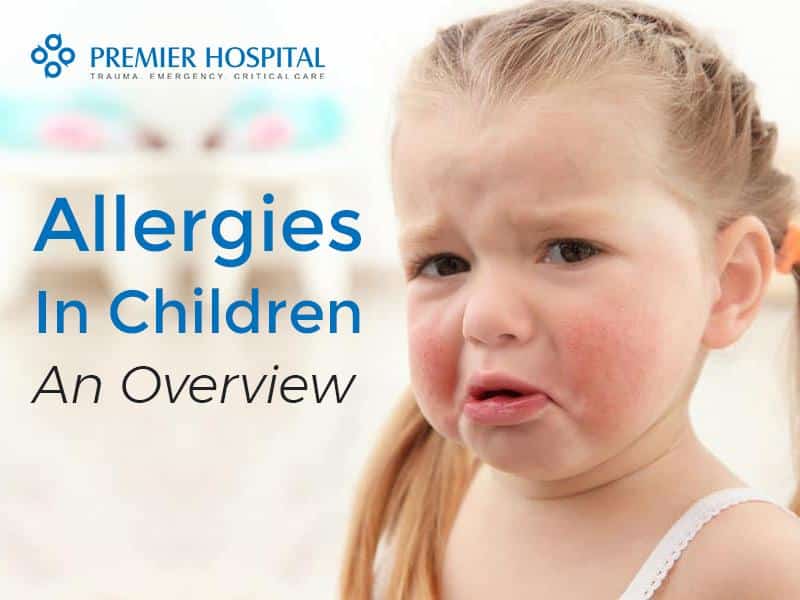Allergies In Children: An Overview
by Premier Hospitals | December 18, 2018 |
Allergies in children have drastically increased in these recent years and, no parents wish to see their child suffer or get ill. Any child can experience allergies due to various circumstances. It is impossible for you to keep monitoring and controlling everything that your child is exposed to or what your child eats throughout the day. Instead, you should focus on taking proper care and keeping an eye on your child to identify the symptoms of allergies.
What Causes Allergies To My Child?
Your child can experience an allergy when his/her immune system reacts to the allergens in the environment. Allergens are classified as airborne allergens, food allergens and other allergens. These allergens might be eaten, inhaled or they may come in contact with the skin. The most common allergens include:
- Pollens: Pollens are the small particles produced by the trees, grass and weeds which are released into the air through insects.
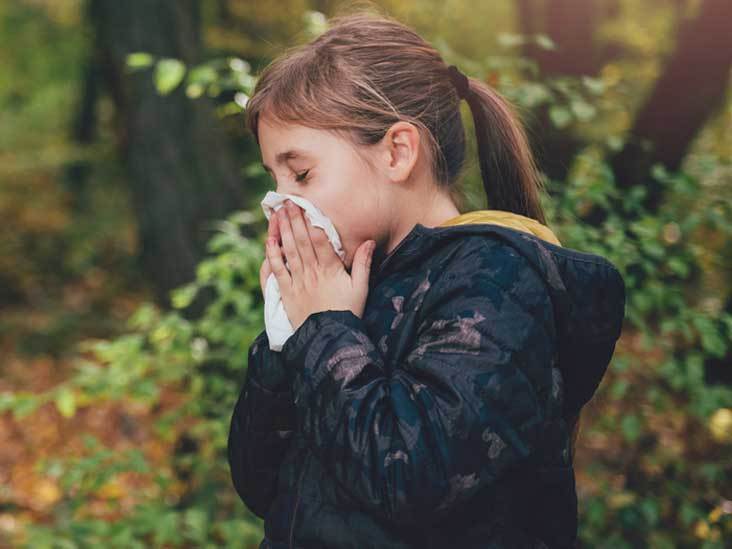
- Moulds: Moulds are fungi that usually grow in warm conditions. In outdoor, moulds can be found at drainage systems, rotten leaves and compost piles. In the house, moulds are formed at the poor ventilation areas such as washrooms. Touching mould or inhaling them can cause fungal infections.
- Pet allergens: Pets fur, hair or flakes of shed skin can cause allergies. Pet urine can also cause allergy to your child.
- Insects: Insect bites and stings can cause insect allergies. They may cause redness, swelling or itching at the site of insect bite. Cockroaches are the major household allergens. Living in a building with cockroach infestation can cause allergies. Dust mites feed on dead skin cells that fall off every day from your body. They can also cause allergies.
- Cow milk: Children below 3 years can be allergic to the proteins found in cows milk.
- Eggs: Eggs are used in many of the food items prepared for children. In many cases, there can be hidden ingredients that cause egg allergies in children.
- Wheat: Wheat proteins are found in many food items. Wheat proteins can also cause allergies which can cause life-threatening reactions.
- Peanuts: Almonds, cashews, hazelnuts can also cause allergies.
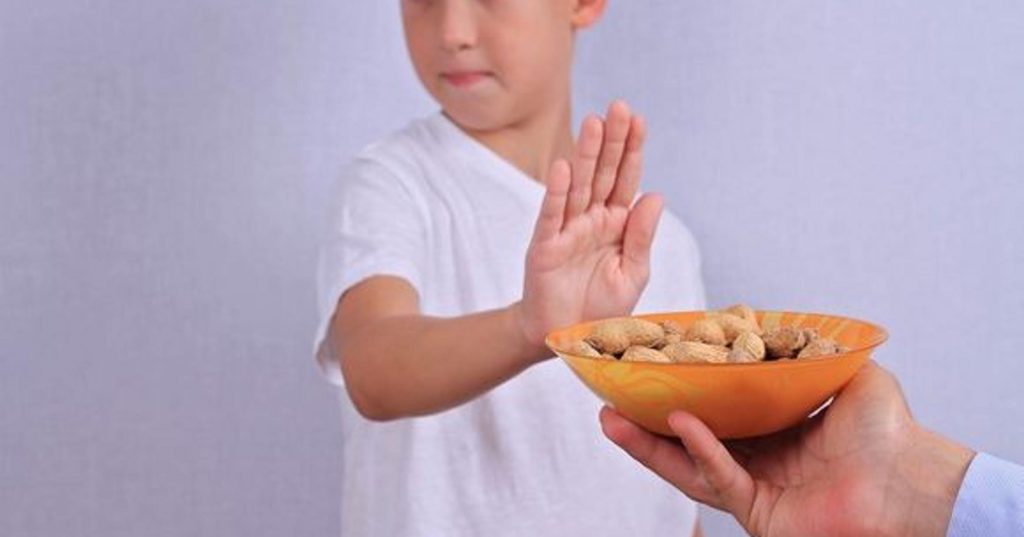
- Medicines: Certain children may be allergic to certain elements of various medicines. Until those components are recognised, keep an eye out for any conditions when you give your child a new medicine.
- Chemicals: Some laundry detergents and cosmetics can lead to allergies in some children. Household cleaners used for floor and pesticides used for plants can also cause allergies in children.
Allergies spread from one person to other. If you have an allergy, the chances for your child to get the allergy is very high. So, try to avoid the things that you or your child is allergic to.
Are There Different Types Of Allergies?
Based on the allergens that cause allergy, allergies are classified as:
- Airborne Allergy: Airborne allergy is caused by the allergens such as pollens, fungal spores and algae. Airborne allergens are usually carried through the air and, it can affect your child’s immune system.
- Food Allergy: Food allergy is often a serious medical condition. Food allergy is a reaction from your child’s immune system after eating a certain food. Food items that can cause food allergy include wheat, peanuts, eggs, cows milk, fish, wheat and soy.
- Allergy due to medicines: Medical allergy is the reaction of the immune system to the medication. Sometimes, the use of antibiotics for children can cause an allergy.
- Insect bite or sting allergy: Usually, insects that bite or sting can cause allergy in children. This allergy is the body’s immune system’s reaction to a sting or an insect bite.
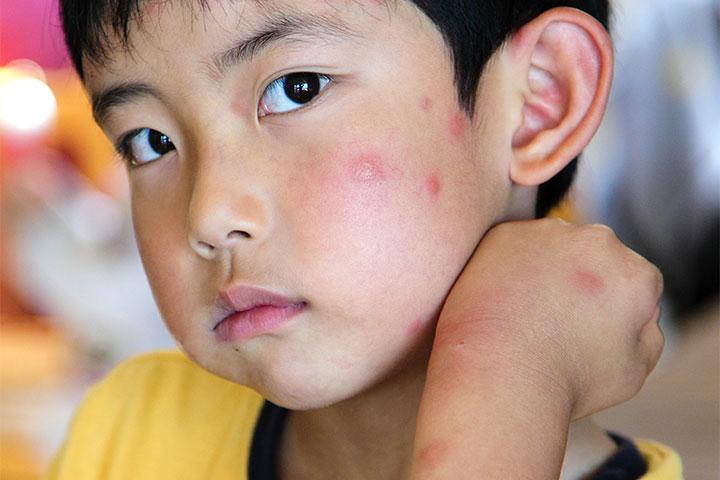
How Can I Identify If My Child Has An Allergy?
Early identification of the allergies in your children can help improve your child’s health and reduce the number of missed school days. The type and severity of the symptoms are different from an allergy to allergy and child to child.
Airborne Allergy Symptoms
The common airborne allergy symptoms include:
- Itchy eyes
- Sneezing or a stuffy nose
- Itchy throat
- Skin rashes
- Coughing
- Itchy, watery or red eyes.
Food, Medicine or Insect Allergy Symptoms
The reactions of allergies can vary from mild to severe. Some common symptoms of food, medicine and insect allergies include:
- Itchy, watery or red eyes
- Coughing
- Wheezing
- Vomitings
- Hives
- Swelling
- Low blood pressure
- Trouble in breathing
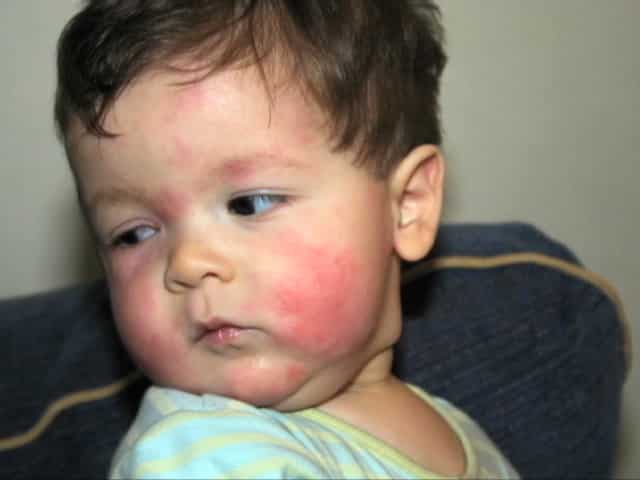
If you find any of the above-mentioned symptoms in your child, make an appointment to meet the doctor to avoid serious consequences.
How Can I Protect My Child From Allergy?
If your child has an allergy, do the following to take care of your child:
- If your child has a pollen allergy, ask your child to take a bath and change his/her clothes after being from outdoors.
- Always keep your house clean and dry to avoid mould and dust mites.
- f you have a pet, maintain it cleanly. Have control over its fur-shedding. Pet fur and hair can collect spores, pores and other allergens in outdoor.
- If you notice that your child is allergic to dust, use special covers to seal pillows and mattress.
- Keep your child away from people who are smoking.
- Remove carpets and rugs from your child’s room as they can collect dust.
- Keep your bathrooms and other mould-prone areas dry and clean.
- If your child has a food allergy, completely avoid the food products that contain their allergens. Read the labels of the packaged item to see if that item contains your child’s allergens.
- Avoid items that can collect dust such as old furniture and heavy drapes.
- Wash your bedsheets in hot water as it can help reduce dust mites.
- If your child has a dust allergy, make your child sit away from the blackboard in the classroom.
- You should also inform your caretakers about your child’s allergy and even the food items that your child should avoid.
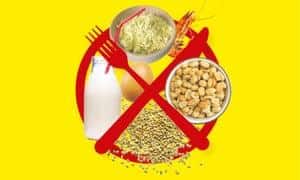
If your child has an allergy, you should teach him/her about the allergy and should make them aware of the allergens that are allergic to your child. You should explain to your child about the reactions they develop when they come in contact or consume those allergens.
How Are Allergies Diagnosed?
Some allergies can be easily identified. On the other hand, identifying few allergies is difficult, unless the doctor conducts a test.
For instance, if your child suffers from the cold for more than a week or two, then make an appointment with the doctor or allergist.
The allergist will diagnose the allergy and can prescribe the medicine.
To identify the cause of the allergy, the allergist will ask your child’s history of allergy and his symptoms of allergy.
The allergist may also perform a skin test. The skin test is usually performed in two ways namely:
- A small amount of liquid form of the allergen is dropped on the skin and that surface of the skin is scratched with a device.
- A small amount of the allergen in the form of liquid is injected into the skin.
After performing the test, if there are swelling and itch like a mosquito bite in that portion, then the test is considered as positive. Based on the results, the doctor makes a diagnosis. He also explains the ways to reduce the allergens that cause allergy to your child.
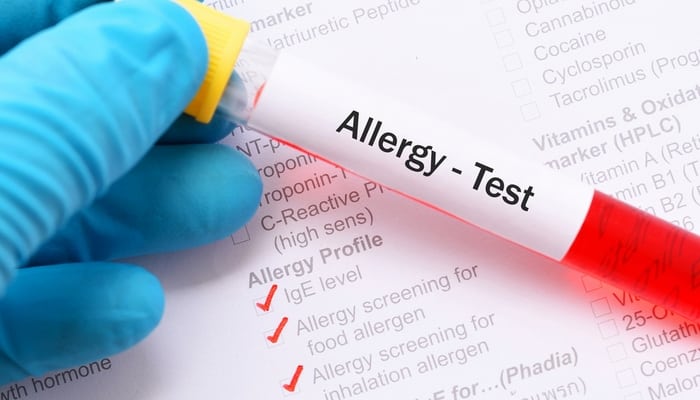
For children who are under specific medication or who have sensitive skin, the doctor may conduct a blood test to determine the cause of the allergy.
How Does a Doctor Treat Allergies?
There is no cure for the allergies, but the symptoms can be reduced. The best way to treat allergies is to reduce the allergens that cause allergy to your child.
If your child develops symptoms even after reducing the allergens, your doctor might prescribe nasal sprays, eye drops or antihistamines. The doctor might also recommend “immunotherapy†to desensitise your child to an allergen. The doctor may also suggest some steroid cream for the skin.
If you suspect that your child has an allergy, instead of going with the over the counter medications, make an appointment with a doctor, who expertise in diagnosing and treating allergies. Before you visit the doctor, keep a track on the symptoms that your child experiences and also the things that you suspect as allergic to your child. Consulting the doctor immediately after alleging an allergy can help you avoid serious health issues in your child.
About The Doctor:
Dr Vivek V. B.
Consultant Pediatrician and Intensivist.

Dr Vivek V. B. is an experienced Consultant Pediatrician and Intensivist. He has done his MBBS, DCH, DNB Pediatrics, FNB Pediatric Intensive Care. At Premier Hospital, Dr Vivek V. B. has been a dedicated presence and has an excellent rapport with patients and attendants.
About The Hospital:
Since the inception of Premier Hospital in 1991 till today, we have grown to unprecedented levels, due to our excellence in medical sciences and healthcare. Premier Hospital is the creation of Dr Mahesh Marda and when it was first established, was only a small, 30-bed hospital facility. Back then, we provided only secondary care to patients, but that certainly has changed in the present landscape.















